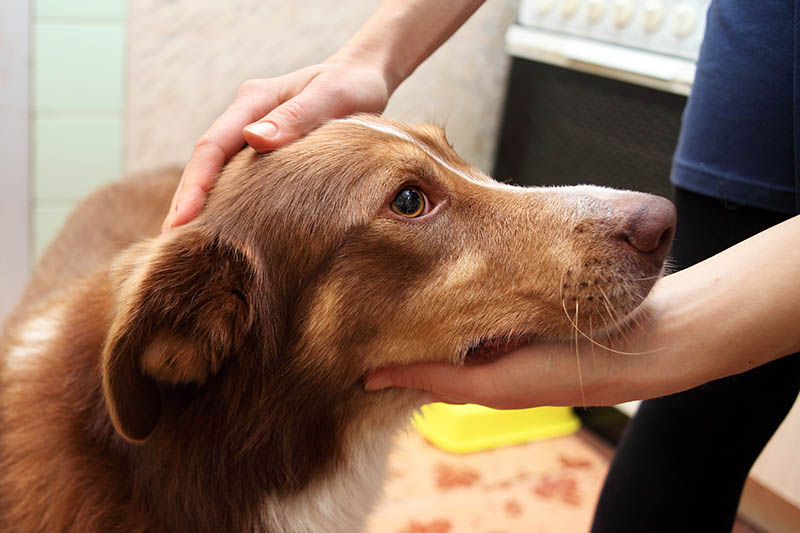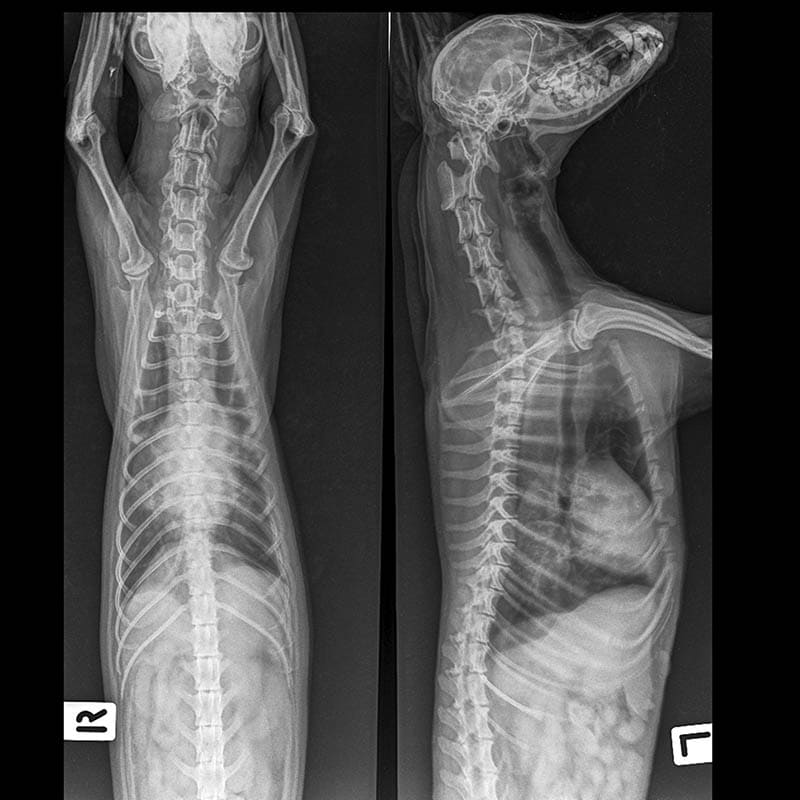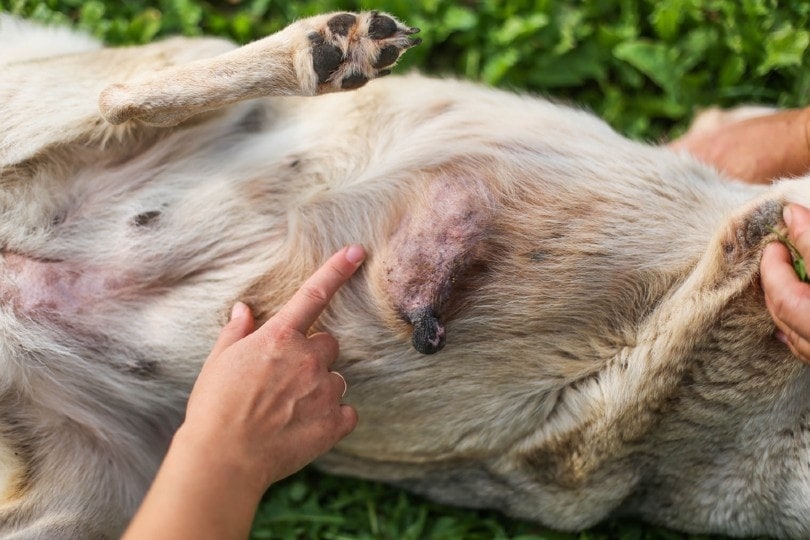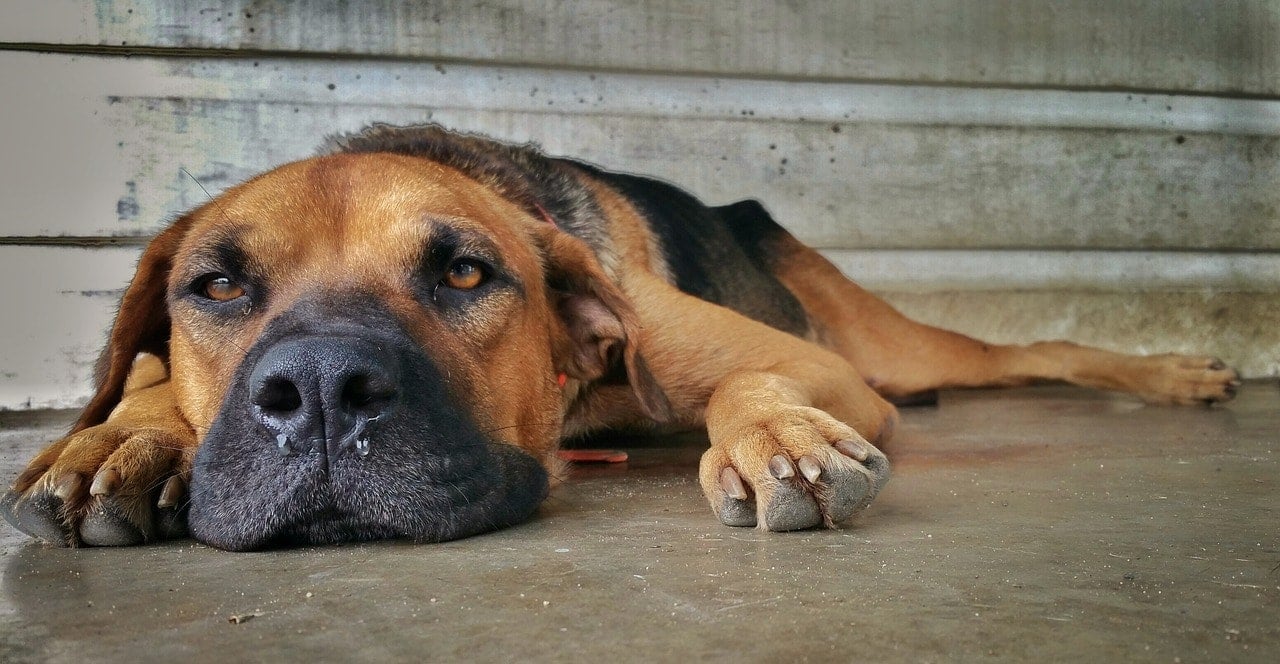My Dog Is Breathing From Their Stomach: 8 Vet-Approved Reasons
By Kit Copson
Updated on

Unusual breathing is a major cause for concern among dog parents. In normal conditions, your dog should move their chest when breathing, with minimal movement of their abdomen. A dog’s stomach is located within the abdomen, and when your dog moves this body part when breathing, it is because they are making an extra effort to breathe air in or out. If your dog’s chest and abdomen are moving when they breathe, accompanied by other signs like flared nostrils, extended neck, blue gums, elbows sticking out, noisy breathing or heavy panting, and shallow breathing, they may be suffering from dyspnea1.
Dyspnea occurs when a dog is having to work harder than usual to breathe, resulting in labored or shallow breathing. If your dog is displaying signs of dyspnea, this is an emergency situation and they need to be seen by a vet immediately.
There are a range of possible reasons a dog may suffer from dyspnea, and in this post, we’ll take a closer look at these causes.
The 8 Most Likely Reasons Your Dog Is Breathing from Their Stomach
1. Fluid in the Lungs

Difficulty breathing can be caused by a buildup of fluid in the lungs, also known as pulmonary edema. This condition is caused by different reasons where fluid accumulates within the lung tissue or in the airways. Heart problems, allergic reactions, low blood proteins, toxins, infections, and tumors are among the main reasons behind this problem.
2. Obstruction
A foreign object obstructing your dog’s respiratory tract is another possible cause of dyspnea. This could be a bone, a piece of material, a rock, a stone, a wrapper—basically, anything they shouldn’t eat that gets accidentally inhaled and stuck in their airway.
3. Tumors

In some cases, tumors can affect your dog’s nose, trachea, or lungs, resulting in signs like coughing, wheezing, labored and/or noisy breathing, and nasal discharge depending on where the tumor is located.
4. Congestive Heart Failure
Congestive heart failure in dogs is most often caused by dilated cardiomyopathy or mitral valve insufficiency (a leaking mitral valve). The condition occurs when a dog’s heart can’t pump blood properly and it can occur on either the left or the right side of the heart. Common signs of congestive heart failure are breathing difficulties and coughing.
5. Chest Trauma

Chest trauma can involve and be caused by injuries to the ribs, chest or windpipe, lung disease, and foreign bodies. Trauma to the chest can result in a buildup of air between the chest wall and the lungs, which becomes trapped. This in turn can prevent the lungs from properly inflating.
6. Respiratory Infections
Respiratory infections can make it difficult for dogs to breathe properly. Pneumonia and complicated kennel cough infections are two such examples, though there are several types of infections that can affect the airways. Respiratory infections may present with signs like labored breathing, coughing, sneezing, fever, loss of appetite, and eye and nasal discharge.

Just like in humans, allergies can affect a dog’s respiratory system. You may spot symptoms like coughing, wheezing, sneezing, and discharge.
7. Heat Stroke
Heat stroke is a serious condition caused by dogs getting too hot. Sadly, in some cases, this occurs as a result of neglect, like a dog being left in a hot car. Certain breeds are even more prone to heat stroke due to having short noses (i.e. French Bulldogs) and/or heavy coats (i.e. Chow Chows).
Signs of heat stroke include difficulty breathing, heavy panting, red gums, vomiting, diarrhea, lethargy, and collapsing. Heat stroke can be fatal if the necessary veterinary attention is not sought in time.
8. Abdominal Conditions

If there’s something not quite right about your dog’s stomach or any other organ in their abdomen, like the presence of a tumor or fluid, being bloated, or having an enlarged stomach, liver, or spleen, this can put pressure on the diaphragm. This can result in a dog struggling to breathe.
Conclusion
The causes of dyspnea in dogs are vast and varied, ranging from allergies to serious heart conditions or traumatic chest injuries. For this reason, it’s crucial to seek immediate medical attention for a dog suffering from breathing difficulties—this includes appearing to breathe from the stomach.
Remain as calm as possible to ease the stress on your dog and act quickly to enhance their chances of getting the treatment they need.
Featured Image Credit: 8th.creator, Shutterstock












